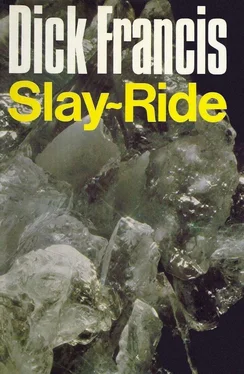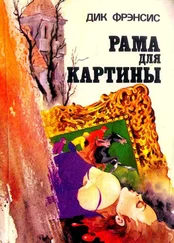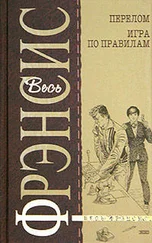‘What was the money contained in?’ I asked.
‘Canvas bags. Heavy double canvas.’
‘What colour?’
He raised his eyebrows. ‘Brown.’
‘Just dumped on the floor?’
He grinned. ‘There is less crime in Norway.’
‘So I’ve heard,’ I said. ‘How many bags?’
‘Five.’
‘Heavy?’
He shrugged. ‘Like money.’
‘How were they fastened?’
‘With leather straps and padlocks.’
Arne cannoned into a blonde who definitely had the right of way. She said something which I judged from his expression to be unladylike, but it still didn’t persuade him to look where he was going. Some enemy lay behind, listening: he was sure of it.
Sandvik gave him an indulgent smile. He was a tall pleasant unhurried man of about fifty, upon whom authority sat as lightly as fluff. Arne had told me he was ‘someone at the top in oil’, but he had none of the usual aura of big business: almost the reverse, as if he derived pleasure from leaving an impression of no power, no aggression. If so, he would be a board-room opponent as wicked as a mantrap among the daisies. I looked at him speculatively. He met my eyes. Nothing in his that shouldn’t be.
‘What was it intended to do with the bags, if Sherman hadn’t nicked them?’ I asked.
‘Lock them in the safe in the officials’ room until Monday morning, when they would go to the bank.’
‘Guarded,’ Arne said, eyes front for once, ‘By a night watchman.’
But by the time the night watchman had clocked in, the booty had vanished.
‘How did the officials all happen to desert the room at once, leaving the money so handy?’ I asked.
Sandvik spread his thickly gloved hands. ‘We have discussed this endlessly. It was accidental. The room can only have been empty for five minutes or less. There was no special reason for them all being out at one time. It just happened.’
He had a high-register voice with beautifully distinct enunciation, but his almost perfect English sounded quite different from the home-grown variety. I worked it out after a while: it was his I’s. The British pronounced ‘I’ with their tongue lolling back in the throat, the Norwegians said theirs with the tongue tight up behind the teeth. Retaining the Norwegian T gave Sandvik’s accent a light, dry, clear-vowelled quality which made everything he said sound logical and lucid.
‘No one realised, that evening, that the money had been stolen. Each of the officials took it for granted that another had put the bags in the safe as they were no longer to be seen. It was the next day, when the safe was opened for the money to be banked, that it was found to be missing. And then, of course, we heard from Gunnar Holth that Sherman had disappeared as well.’
I thought. ‘Didn’t Gunnar Holth tell me that Bob Sherman stayed with you once or twice?’
‘Yes, that’s right.’ Sandvik briefly pursed his well-shaped mouth. ‘Twice. But not the time he stole the money, I’m glad to say.’
‘You liked him, though?’
‘Oh yes, well enough, I suppose. I asked him out of politeness. He had ridden several winners for me, and I know what Gunnar’s bunk room is like...’ He grinned slightly. ‘Anyway, he came. But we had little of common interest except horses, and I think he really preferred Gunnar’s after all.’
‘Would you have expected him to steal?’
‘It never crossed my mind. I mean, it doesn’t does it? But I didn’t know him well.’
Arne could not bear the close quarters of the crowd on the stands, so we watched the first race, a hurdle, from rising ground just past the winning post. The racecourse, forming the floor of a small valley, was overlooked on all sides by hillsides of spruce and birch, young trees growing skywards like the Perpendicular period come to life. The slim dark evergreens stood in endless broken vertical stripes with the yellow-drying leaves and silver trunks of the birch, and the whole backdrop, that afternoon, was hung along the skyline with fuzzy drifts of misty low cloud.
The light was cold grey, the air cold damp. The spirits of the crowd, sunny Mediterranean. An English jockey won the race on the favourite and the crowd shouted approval.
It was time, Sandvik said, to go and see the Chairman, who had not been able to manage us sooner on account of lunching a visiting ambassador. We went into the Secretariat building adjoining the grandstand, up some sporting print-lined stairs, and into a large room containing not only the Chairman but five or six supporting Stewards. Per Børn Sandvik walked in first, then me, then Arne pushing his hood back, and the Chairman went on looking enquiringly at the door, still waiting for me, so to speak, to appear. I sometimes wondered if it would help if I were fat, bald and bespectacled: if premature ageing might produce more confidence and belief than the thin-six-feet-with-brown-hair job did. I’d done a fair amount of living, one way or another, but it perversely refused to show.
‘This is David Cleveland,’ Sandvik said, and several pairs of eyes mirrored the same disappointment.
‘How do you do,’ I murmured gently to the Chairman, and held out my hand.
‘Er...’ He cleared his throat and recovered manfully. ‘So glad you have come.’
I made a few encouraging remarks about how pleasant I found it in Norway and wondered if any of them knew that Napoleon was promoted General at twenty-four.
The Chairman, Lars Baltzersen, was much like his letters to my office, brief, polite and effective. It took him approximately ten seconds to decide I wouldn’t have been given my job if I couldn’t do it, and I saw no need to tell him that my boss had died suddenly eighteen months earlier and left the manager-elect in charge a lot sooner than anyone intended.
‘You sound older on the telephone,’ he said simply, and I said I’d been told so before, and that was that.
‘Go anywhere you like on the racecourse,’ he said. ‘Ask anything... Arne can interpret for those who do not speak English.’
‘Thank you.’
‘Do you need anything else?’
Second sight, I thought; but I said, ‘Perhaps, if possible, to see you again before I go at the end of the afternoon.’
‘Of course. Of course. We all want to hear of your progress. We’ll all gather here after the last race.’
Heads nodded dubiously, and I fully expected to justify their lowly expectations. Either briefed or bored or merely busy, they drifted away through the door, leaving only Arne and the Chairman behind.
‘Some beer?’ suggested Baltzersen.
Arne said yes and I said no. Despite the glow from a huge stove it was a cold day for hops.
‘How far is it to the Swedish border?’ I asked.
‘By road, about eighty kilometres,’ Baltzersen said.
‘Any formalities there?’
He shook his head. ‘Not for Scandinavians in their own cars. There are few inspections or customs. But none of the frontier posts remember an Englishman crossing on that evening.’
‘I know. Not even as a passenger in a Norwegian car. Would he have been spotted if he’d gone across crouching under a rug on the floor behind the driver’s seat?’
They pondered. ‘Very probably not,’ Baltzersen said, and Arne agreed.
‘Can you think of anyone who might have taken him? Anyone he was close to here, either in business or friendship?’
‘I do not know him well enough,’ the Chairman said regretfully, and Arne blinked a little and said Gunnar Holth, or maybe some of the lads who worked for him.
‘Holth says he drove him only round to the races,’ I said: but he would have had plenty of time to drive into Sweden and back before Emma Sherman had rung him up.
‘Gunnar tells lies whenever it suits him,’ Arne said.
Читать дальше



